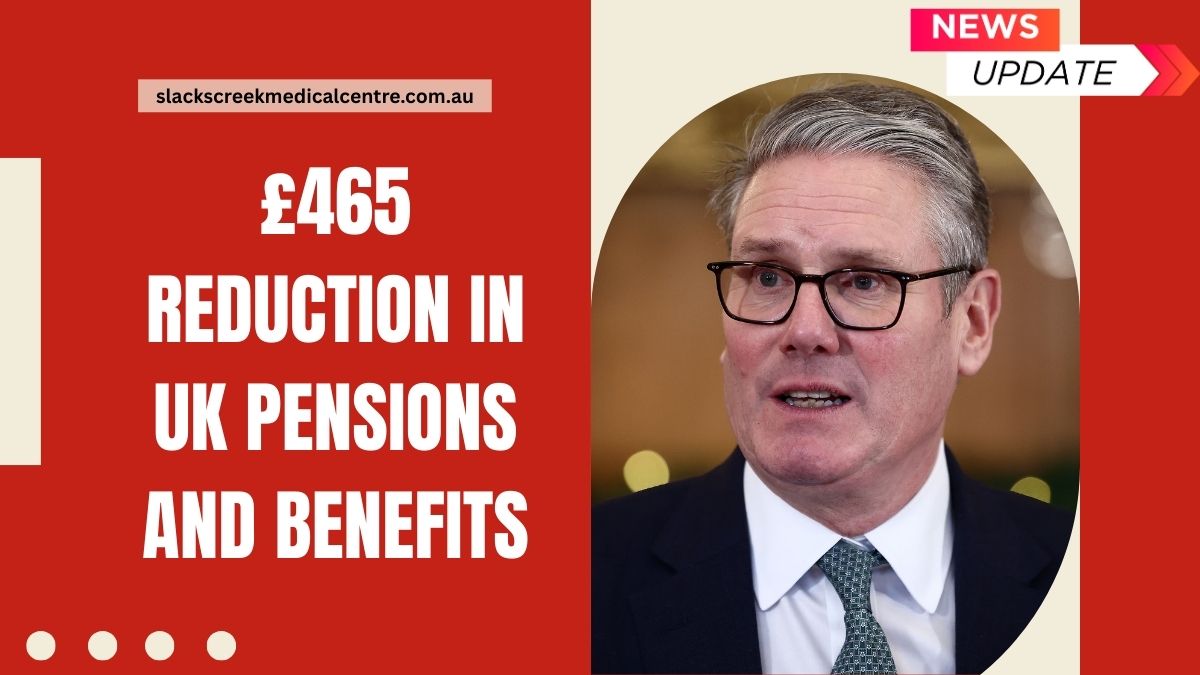The UK government’s recent announcement of a £465 cut to pensions and benefits has raised concerns, especially among pensioners, disabled individuals, and low-income households.
With millions depending on state support, this reduction will have a significant impact, particularly as inflation continues to drive up the cost of living.
This article will explain the key changes, identify who is affected, and provide practical advice on how to manage the upcoming reductions.
Key Details of the £465 Cut to UK Pensions and Benefits
| Feature | Details |
|---|---|
| Pension Credit Cut | £465 per year for single pensioners, £710 for couples |
| Winter Fuel Payment | Now means-tested; affects up to 100,000 pensioners |
| State Pension Increase | £70 annual increase for the full new state pension |
| Universal Credit Freeze | Sickness benefits frozen until 2030 |
| Payment Date | Changes will affect payments starting April 2025 |
Why Are These Changes Happening?
As part of the UK government’s fiscal strategy, there has been an effort to reduce public spending on welfare programs.
According to the Spring Statement 2025 by Chancellor Rachel Reeves, the government plans to cut the welfare budget by £3.4 billion in the coming years to improve the country’s fiscal health, reduce the national debt, and support infrastructure investment.
However, these cuts come at a significant cost to vulnerable citizens, especially pensioners and disabled individuals.
The means-testing approach will now be used to determine eligibility for certain benefits, shifting from universal benefits to more targeted aid.
Who Is Affected by the £465 Cut?
- Single Pensioners on Pension Credit: For single pensioners receiving Pension Credit, the annual reduction of £465 is a real-terms cut. This can significantly impact individuals relying on these payments to cover essential expenses such as food, heating, and transportation.
- Couples Receiving Pension Credit: Couples who qualify for Pension Credit will experience a £710 reduction in total, further exacerbating financial strain. Many of these couples will need to reassess their monthly spending, prioritizing essential needs while possibly cutting back on discretionary items.
- Winter Fuel Payments: The Winter Fuel Payment, traditionally available to all pensioners, will now be means-tested, meaning only those with lower incomes will qualify. This could affect up to 100,000 pensioners and result in a £300–£400 loss for many households during winter months when heating bills are highest.
- People on Universal Credit Due to Health Conditions: Individuals unable to work due to long-term illness or disability will face further challenges. The freeze on Universal Credit sickness benefits until 2030 means that payments will not increase in line with inflation. Over the coming years, the equivalent of Incapacity Benefit could drop by 50%, further reducing income for these vulnerable claimants.
READ MORE: New DWP Cost of Living Payments Begin In April 2025 – UK Households Urged To Check Eligibility Now
How to Check If You Are Affected
Navigating these changes can be complex, but here are some steps you can take to check if you’re impacted:
Step 1: Review Your Current Benefits
Log into your GOV.UK account and check your recent benefit statements. Identify which of the following benefits you currently receive:
- Pension Credit
- State Pension
- Universal Credit
- Winter Fuel Payment
- Personal Independence Payment (PIP)
Step 2: Compare Payment Structures
Use comparison tools available on websites like Age UK and Citizens Advice to see how your 2024 and 2025 payments compare.
Step 3: Assess Financial Impact
Calculate your total benefits for the year and compare how much less you will receive with the upcoming cuts. This will give you a clear understanding of the financial impact.
What You Can Do to Prepare
While these cuts are concerning, there are steps you can take to mitigate the financial impact:
1. Apply for Additional Support
If you lose eligibility for one benefit, you may qualify for other types of assistance, such as:
- Cold Weather Payments (automatic during severe conditions)
- Household Support Fund (via local authorities)
- Warm Home Discount (reduces electricity bills)
2. Track Inflation and Adjust Your Budget
As benefit increases lag behind inflation, it’s essential to adjust your budget accordingly. Consider:
- Reducing energy usage with smart meters
- Switching to cheaper supermarkets
- Reviewing utility contracts for better deals
3. Seek Independent Advice
Professional advice can help you navigate these changes:
- Citizens Advice
- Age UK
- Turn2us
These organizations can assist with: - Appealing benefit decisions
- Filling out complex forms
- Identifying missed entitlements
The £465 cut to UK pensions and benefits will undeniably impact many vulnerable citizens, especially pensioners and individuals with disabilities.
However, by carefully checking your eligibility, staying informed, and making adjustments to your budget, you can better manage the financial challenges posed by these cuts.
Remember to explore additional support options and seek professional advice to help you navigate these changes in 2025.
FAQs
How much will my pension benefits be reduced by in 2025?
Single pensioners will see a £465 reduction, while couples will lose £710 annually under the new Pension Credit rules.
How does the Universal Credit freeze affect me?
If you’re on Universal Credit due to health conditions, the freeze means your benefits won’t increase with inflation, impacting your financial situation until 2030.
How can I apply for additional support if I lose eligibility?
You can apply for Cold Weather Payments, the Household Support Fund, or the Warm Home Discount to help manage your expenses.

